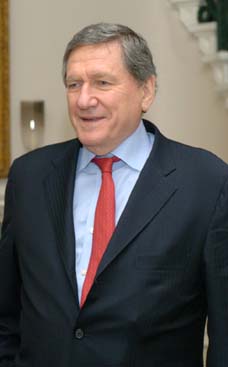
There is an old saying in Guizhou. Perhaps it is a proverb, but I'm not exactly sure. It is something like this: "In Guizhou there are no 3 kilometers without a mountain, no 3 days without rain, and no 3 coins in one pocket." I think it would be truer if someone changed the number to 2, but I'm not in charge of proverb modification. The poverty of Guizhou is often a hidden poverty because most of this poverty is not desperate. Instead it's people who simply cannot afford anything extra. It's people without health care who have yet to feel any real "trickle down" from the super wealthy coastal cities who have the means to export goods. It is a poverty of a fatalistic people whose solution to bitterness is almost too easy: just swallow.
Dustin Ooley writes: Reflections on Guizhou
Guizhou de fanying - Reflections on Guizhou
Looking out of the window on a train in spring one can see fields of blooming rapeseed flowers. A sea of yellow covers the low-lying areas, while barren haystack hills stand defiantly, refusing to bear crops. Or in late summer one can see the same area blanketed by rice paddies. The same mountains dotted with corn where seeds found purchase among the sparse soil. It's still amazing to me how they manage to contain the water in terraced fields of rice without any heavy equipment. With only the use of water buffalo and crude tills the fields are overturned season after season, crops rotating according to the customs passed down from a long agrarian past.
I am a Peace Corps Volunteer in China, the wealthiest country to which Peace Corps currently sends volunteers. Throughout my training I heard the phrase "Posh Corps" used to describe our situation in this country. My home stay family was quite well off by Chinese standards, and I jokingly referred to my family as having the "Big 5" (air conditioning, mattress, car, Internet, and western toilet).
When we moved to our "rural" sites it wasn't much different. I was at one of the most rural sites in the country, just outside a city of around 300,000 people. It lead to questions for someone who joined Peace Corps to help the world's poor. Why were we here?
Our college is rural enough to be just on the edge of poverty. I see it daily outside the walls of the college. I see it behind the eyes of staring peasants wandering down the streets with cabbage hanging from their shoulder poles. Children playing with sticks wander the college in search of plastic bottles to sell. They are happily packing their cheap plastic bags of bottles, dressed in grubby clothes. I pull an empty bottle from my bag and a boy smiles broadly before stuffing it into his bag wordlessly.
On the crowded bus a woman propped a large bag of rice against the wall in a standing area. Before she got off the bag had spilled on the floor and she had lost perhaps a quarter of it. She was too embarrassed to do anything but gather up the bag and her basket before quickly disembarking. By the next stop an older woman was gathering up the spilled rice, while explaining to everyone in Chinese, "I can clean this and it will be ok to eat." This is her explanation in a country where people are so afraid of getting disease from the ubiquitous spit on the ground that they refuse to set even a book-bag down. Most people refuse to sit down on the curb. If there is no newspaper to serve as an intermediary, they will squat.
It's easy to understand a student's financial situation by asking them to lunch. Do they eat in the Cafeteria on campus or outside the school gate? What sort of expression do they wear when I invite them off campus to eat? If it's a sort of fear and surprise, they probably can't afford it. But so often students will go along anyway, insisting at the end of the meal that they will pay. They want to show their respect for the teacher, even going to lengths of deception to pay the bill before I realize what has happened. Once I found myself coming back to the table with another bowl of rice and later found out that the bill had been paid when I was off getting the rice. This is a generosity that has arisen from nothing but a cultural hospitality, as it certainly hasn't evolved from financial capacity. It didn't take long for me to realize that my monthly $195 Peace Corps stipend made me fairly well off in rural China, especially when I only spent under half of it on food, and the extent of my American materialism is buying candles for power-outages.
I asked an old woman on the bus what kind of corn she was eating, where she bought it and for how much. She broke a piece of the ear and handed it to me. "Here, have some," she said with a genuine intention of giving me my first taste of roasted corn in China.
There is an old saying in Guizhou. Perhaps it is a proverb, but I'm not exactly sure. It is something like this: "In Guizhou there are no 3 kilometers without a mountain, no 3 days without rain, and no 3 coins in one pocket." I think it would be truer if someone changed the number to 2, but I'm not in charge of proverb modification.
The poverty of Guizhou is often a hidden poverty because most of this poverty is not desperate. Instead it's people who simply cannot afford anything extra. It's people without health care who have yet to feel any real "trickle down" from the super wealthy coastal cities who have the means to export goods. It is a poverty of a fatalistic people whose solution to bitterness is almost too easy: just swallow.
How can I help? What can I do to change a country? These questions plagued me once, and then I decided to just do what I could without worrying so often. It doesn't take much: a few minutes of conversation, the explanation of something from their English books. I don't think so big anymore. I don't think about the systems that are broken or the backwards bureaucracy. I concern myself with the people to whom I can offer help. I think of the students who need me. I don't think of the great disparities of Beijing and the Chinese rural countryside. I don't lose sleep over the great face China put on Beijing for the Olympics, while the rest of the country continues to struggle with poverty and stifled development - some buildings left empty for years after construction. Idealism is a funny thing: you have to be a good realist before you can fulfill an idealistic mission. You must believe that there is some level of practical application that will sustain your idea of the possibility for a better world. And you have to learn to tactically ignore quite a lot as well.











